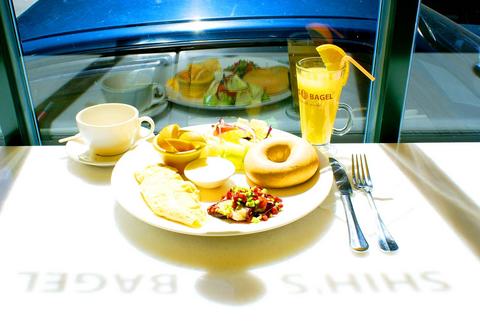Taipei's anonymous districts are turning into neighborhoods. Homogenous barrack-style buildings are gradually being torn down or renovated, creating unique residential areas with character. All the construction going on indicates that Taipei is reinventing itself into an international city, and its cafes and restaurants are following suit.
Shih Horng-ren (施弘仁) has this same international vision for his eatery. The owner of the recently opened Shih's Bagels first fell in love with the round breads when he was studying for his master's degree at Yale University. He recounts walking the cold winter streets of New Haven looking forward to entering a bagel shop, from where the smell of cinnamon and raisins wafted out onto the sidewalk and "you could feel the warmth of the bagels."
To help him fulfill his dream, he has hired Israeli chef Amir Arie who has added salads, soups and desserts - all made from scratch - to the menu.

PHOTO: NOAH BUCHAN, TAIPEI TIMES
But bagels are Shih's stock and trade and he bakes seven different varieties - plain, cinnamon raisin, blueberry, sesame and black sesame, cheese, black pepper and green tea (NT$40 each, or buy five get one free) - on the premises for all to see.
He plans to add black olive, onion, sun dried tomato, sunflower seed and whole wheat within the next month or so. Don't expect poppy seed bagels, though, Shih says, as the ingredient is a controlled substance in Taiwan.
As one might expect, Shih's menu is heavy on daytime dining and light in the evening. The all-day breakfast menu features two set meals, each NT$180. Set A features a two-egg omelet, home fried potatoes (though I substituted a delicious marinated eggplant salad), green salad, fruit, bagel and choice of tea, milk or bottomless Davidoff coffee. Set B is the same, but with the option of substituting bacon for the potatoes.
Lunch consists of classic bagel sandwiches and includes smoked salmon and cream cheese (NT$160), roast beef (NT$140), chicken (NT$130) and ham or egg and tomato (NT$120). I opted for the ham sandwich. The potato salad made up most of the center of the sandwich, which, though tasty, wasn't what I was expecting. Some veggies other than lettuce and a zesty compliment like hot mustard could have livened the ensemble up a bit.

Wooden houses wedged between concrete, crumbling brick facades with roofs gaping to the sky, and tiled art deco buildings down narrow alleyways: Taichung Central District’s (中區) aging architecture reveals both the allure and reality of the old downtown. From Indigenous settlement to capital under Qing Dynasty rule through to Japanese colonization, Taichung’s Central District holds a long and layered history. The bygone beauty of its streets once earned it the nickname “Little Kyoto.” Since the late eighties, however, the shifting of economic and government centers westward signaled a gradual decline in the area’s evolving fortunes. With the regeneration of the once

Even by the standards of Ukraine’s International Legion, which comprises volunteers from over 55 countries, Han has an unusual backstory. Born in Taichung, he grew up in Costa Rica — then one of Taiwan’s diplomatic allies — where a relative worked for the embassy. After attending an American international high school in San Jose, Costa Rica’s capital, Han — who prefers to use only his given name for OPSEC (operations security) reasons — moved to the US in his teens. He attended Penn State University before returning to Taiwan to work in the semiconductor industry in Kaohsiung, where he

In February of this year the Taipei Times reported on the visit of Lienchiang County Commissioner Wang Chung-ming (王忠銘) of the Chinese Nationalist Party (KMT) and a delegation to a lantern festival in Fuzhou’s Mawei District in Fujian Province. “Today, Mawei and Matsu jointly marked the lantern festival,” Wang was quoted as saying, adding that both sides “being of one people,” is a cause for joy. Wang was passing around a common claim of officials of the People’s Republic of China (PRC) and the PRC’s allies and supporters in Taiwan — KMT and the Taiwan People’s Party — and elsewhere: Taiwan and

Perched on Thailand’s border with Myanmar, Arunothai is a dusty crossroads town, a nowheresville that could be the setting of some Southeast Asian spaghetti Western. Its main street is the final, dead-end section of the two-lane highway from Chiang Mai, Thailand’s second largest city 120kms south, and the heart of the kingdom’s mountainous north. At the town boundary, a Chinese-style arch capped with dragons also bears Thai script declaring fealty to Bangkok’s royal family: “Long live the King!” Further on, Chinese lanterns line the main street, and on the hillsides, courtyard homes sit among warrens of narrow, winding alleyways and